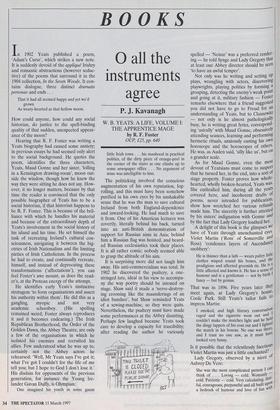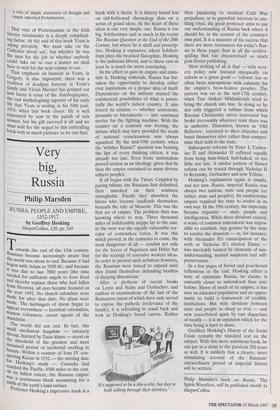BOOKS
n 1902 Yeats published a poem, `Adam's Curse', which strikes a new note. It is suddenly devoid of the appliqué Irishry and romantic abstractions (however seduc- tive) of the poems that surround it in the 1904 collection, In the Seven Woods. It con- tains dialogue, three distinct dramatis personae and ends ...
That it had all seemed happy and yet we'd grown As weary-hearted as that hollow moon.
How could anyone, how could any social historian, do justice to the spell-binding quality of that sudden, unexpected appear- ance of the moon?
Hearing that R. F. Foster was writing a Yeats biography had caused some anxiety; in previous essays he had seemed only alert to the social background. He quotes the poem, identifies the three characters, Yeats, Maud Gonne and her sister, 'lolling in a Kensington drawing-room', moon out- side the window, though how he knew the way they were sitting he does not say. How- ever, it no longer matters, because by that time the reader is convinced that the only possible biographer of Yeats has to be a social historian, if that historian happens to be R. F. Foster. This is because of the bril- liance with which he handles his material and because of the extraordinary depth of Yeats's involvement in the social history of his island and his time. He set himself the task of recreating Ireland's cultural con- sciousness, navigating it between the big- otries of Irish Nationalism and the limiting pieties of Irish Catholicism. In the process he had to create, and continually recreate, himself, and instead of deprecating these transformations (`affectations'), you can feel Foster's awe mount, as does the read- er's, at the Protean energy of the attempt.
He identifies early Yeats's instinctive stratagem `to form organisations and assert his authority within them'. He did this as a gangling, myopic and not very academic schoolboy. (His spelling remained weird; Foster always reproduces it and it becomes endearing.) The Irish Republican Brotherhood, the Order of the Golden Dawn, the Abbey Theatre, are only a few of the organisations in which he isolated his enemies and recruited his allies. Few understood what he was up to, certainly not the Abbey actors he rehearsed: 'Well, Mr Yeats says I've got it; what I've got I couldn't for the life of me tell you; but I hope to God I don't lose it.' His disdain for opponents of the previous generation, for instance the Young Ire- lander Gavan Duffy, is Olympian: One imagined his youth in some gaunt
0 all the instruments agree
P. J. Kavanagh
W. B. YEATS: A LIFE, VOLUME I: THE APPRENTICE MAGE by R. F. Foster OUP, £25, pp. 640
little Irish town . . . his manhood in practical politics, of the dirty piece of orange-peel in the corner of the stairs as one climbs up to some newspaper office . . . No argument of mine was intelligible to him.
The politicking involved the conscious augmentation of his own reputation, log- rolling, and this must havp been somehow purified in his own eyes by his unshakable sense that he was the man to save cultural Ireland from both England-dependence and inward-looking. He had much to save it from. One of his American lectures was covertly, literally behind his back, turned into an anti-British demonstration of support for Russian aims in Asia; behind him a Russian flag was hoisted, and beard- ed Russian ecclesiastics took their places. It is all rather comic; nobody seemed able to grasp the altitude of his aim.
It is surprising more did not laugh him away. His anti-commercialism was total. In 1902 he discovered the psaltery, a one- stringed lute, ideal in his view to accompa- ny the way poetry should be intoned on stage. Shaw said it made a 'nerve-destroy- ing crooning like the maunderings of an idiot banshee', but Shaw reminded Yeats of a sewing-machine, so they were quits. Nevertheless, the psaltery must have made some performances at the Abbey daunting. Perhaps few laughed because Yeats took care to develop a capacity for irascibility; after reading the author he variously spelled — 'Neisze' was a preferred render- ing — he told Synge and Lady Gregory that at least one Abbey director should be seen `to have an awful temper'. Not only was he writing and setting up plays, wrangling with actors, discovering playwrights, playing politics by forming a grouping, detecting the enemy's weak point and going at it, military fashion — Foster remarks elsewhere that a friend suggested you did not have to go to Freud for an understanding of Yeats, but to Clausewitz — not only is he almost pathologically busy, he is writing great lyrics, correspond- ing 'astrally with Maud Gonne, obsessively attending seances, learning and performing hermetic rituals, anxiously casting his own horoscope and the horoscopes of others. He was, as Auden said, 'silly like us', but on a grander scale. As for Maud Gonne, even the most devout of Yeatsians must come to suspect that he turned her, in the end, into a sort of stage property. Foster proves how whole- hearted, wholly broken-hearted, Yeats was. She enthralled him, during all the Years, covered here, and incoherent drafts of poems, never intended for publication, show how wretched her various refusals made him. The sincerity is further attested by his sisters' indignation with Gonne and by the fact that Lady Gregory loathed her.
A delight of this book is the glimpses we have of Yeats through unenchanted eyes. Violet Martin (`Ross' of Somerville and Ross) 'condenses layers of AscendancY snobbery': He is thinner than a lath — wears paltry little clothes wisped round his bones, and the prodigious and affected greenish tie. He is ar little affected and knows it. He has a sense °f humour and is a gentleman — not by birth I fancy — but by genius.
That was in 1896. Five years later they meet again, at Lady Gregory's house, Coole Park. Still Yeats's tailor fails to impress Martin: I smoked, and high literary conversation raged and the cigarette went out and I couldn't make the matches light and he held the dingy lappets of his coat out and I lighted the match in his bosom. No one was there, and I trust no one saw, as it must have looked very funny.
Is it possible that the relentlessly facetious Violet Martin was just a little enchanted? , Lady Gregory, observed by a niece 01 Aubrey De Vere: She was the most complicated person I can think of . . . Loving — cold. Womanly -- cold. Patriotic — cold. Very calculating, duti" ful, courageous, purposeful and all built upon a bedrock of humour and love of fun with
a vein of simple coarseness of thought and simple inherited Protestantism.
That vein of Protestantism in the Irish literary renaissance is a deeply complicat- ing factor. At the end of this book Yeats is saying privately, 'We must take on the Catholics about sex', but whether he was the man for the job or whether anybody Could 'take on' so vast a matter we shall have to wait for the next volume to see.
That emphasis on humour in Yeats, in Gregory, is also important; there was a tradition of deadpan humour in Yeats's family and Vivian Mercier has pointed out how funny is some of the Autobiographies, the vast mythologising tapestry of his early life that Yeats is writing in his 50th year, 1914, when this book closes. He is well ensconced by now in the parish of rich women, but his gift survived it all and we must wait for the sequel to this enthralling book with as much patience as we can find.



































































 Previous page
Previous page